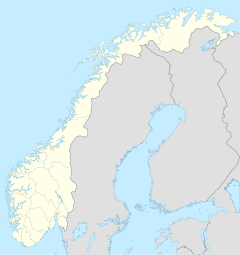Marnardal Station
|
Marnardal
|
|
|---|---|
 |
|
| Location | Marnardal, Marnardal Norway |
| Coordinates | 58°12′45.18″N 07°30′43.77″E / 58.2125500°N 7.5121583°ECoordinates: 58°12′45.18″N 07°30′43.77″E / 58.2125500°N 7.5121583°E |
| Elevation | 38.3 m (126 ft) AMSL |
| Owned by | Norwegian National Rail Administration |
| Operated by | Norwegian State Railways |
| Line(s) | Sørlandet Line |
| Distance | 402.02 km (249.80 mi) |
| Platforms | 2 |
| Tracks | 3 |
| Construction | |
| Parking | 15 places |
| Bicycle facilities | Yes |
| Disabled access | Yes |
| Architect | NSB Arkitektkontor |
| History | |
| Opened | 17 December 1943 |
| Rebuilt | 2012 |
| Traffic | |
| Passengers | 21,700 (annually) |
| Location | |
Marnardal Station (Norwegian: Marnardal stasjon) is a railway station of the Sørlandet Line situated just north of the village of Heddeland in Marnardal municipality in Vest-Agder county, Norway. Located 402.02 kilometers (249.80 mi) from Oslo Central Station, it is served by long-distance trains operated by the Norwegian State Railways. In addition to intercity services to Oslo and Stavanger, the reight daily trains in each direction trains serve as a commuter link to Kristiansand Station. The station features two platform and three tracks, as well as a station building.
The station was opened on 17 December 1943 as part of the segment of the Sørlandet Line between Kristiansand and Sira. The line past the station was electrified from 18 February 1944. The station was automated in 1969, but remained manned until 1988. The passing loop was extended in 1992, reaching its current length of 803 meters (2,635 ft). The platforms were renovated and extended in 2012. Marnardal Station had 21,700 passengers in 2008.
Marnardal Station was built during the Second World War under the German-administrated expansion of the Sørlandet Line west of Kristiansand. Instead of running along the more densely populated coast, the line was built through the interior of Vest-Agder. Marnardal Station was planned as a primary station, which was to serve the Marnardal valley and its various communities. This included the coastal town of Mandal, situated 25 kilometers (16 mi) to the south, at the mouth of the valley. The station was originally proposed to be named Øyslebø, the name of the municipality at the time. Instead a new name was constructed by folklorist Knut Liestøl. He took the name of the river, Mandalselva, used its genitive form marnar and added suffix dal which means "valley". The name was so quickly adopted by the locals that it was used as the name of the new municipality in the municipal amalgamation that occurred in 1964.
...
Wikipedia


